2013 汉英翻译 主语的选择
- 格式:ppt
- 大小:793.00 KB
- 文档页数:43

![汉英笔译基础教程第10章 主语的选择[精]](https://uimg.taocdn.com/2258dbc2d1f34693dbef3e1b.webp)

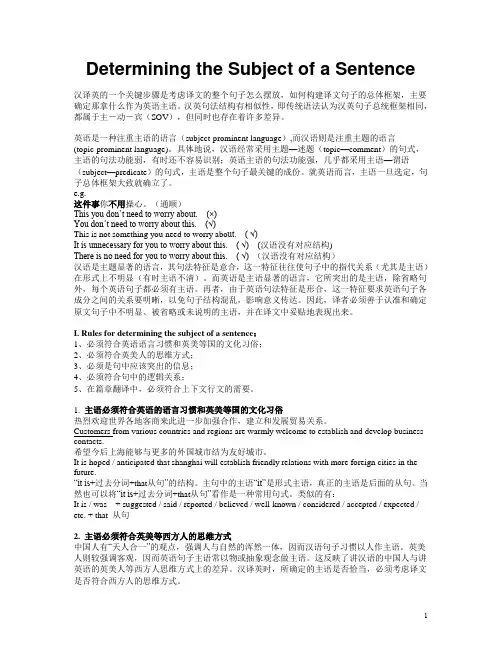
Determining the Subject of a Sentence汉译英的一个关键步骤是考虑译文的整个句子怎么摆放,如何构建译文句子的总体框架,主要确定那拿什么作为英语主语。
汉英句法结构有相似性,即传统语法认为汉英句子总统框架相同,都属于主-动-宾(SOV),但同时也存在着许多差异。
英语是一种注重主语的语言(subject-prominent language),而汉语则是注重主题的语言(topic-prominent language)。
具体地说,汉语经常采用主题—述题(topic—comment)的句式,主语的句法功能弱,有时还不容易识别;英语主语的句法功能强,几乎都采用主语—谓语(subject—predicate)的句式,主语是整个句子最关键的成份。
就英语而言,主语一旦选定,句子总体框架大致就确立了。
e.g.这件事你不用操心。
(通顺)This you don’t need to worry about. (×)You don’t need to worry about this. (√)This is not something you need to worry abo ut. ( √)It is unnecessary for you to worry about this. ( √) (汉语没有对应结构)There is no need for you to worry about this. ( √) (汉语没有对应结构)汉语是主题显著的语言,其句法特征是意合,这一特征往往使句子中的指代关系(尤其是主语)在形式上不明显(有时主语不清)。
而英语是主语显著的语言,它所突出的是主语,除省略句外,每个英语句子都必须有主语。
再者,由于英语句法特征是形合,这一特征要求英语句子各成分之间的关系要明晰,以免句子结构混乱,影响意义传达。
因此,译者必须善于认准和确定原文句子中不明显、被省略或未说明的主语,并在译文中妥贴地表现出来。
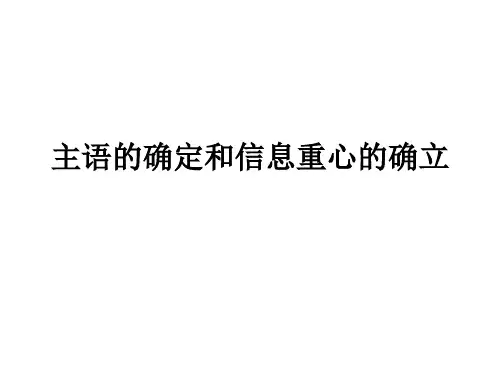
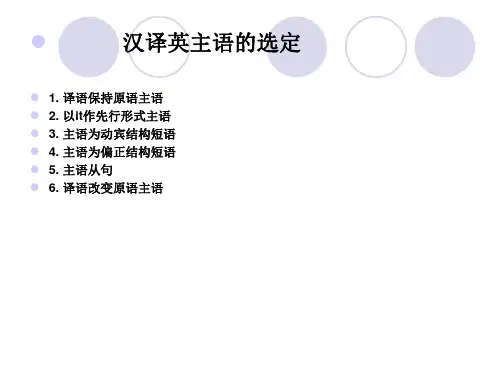
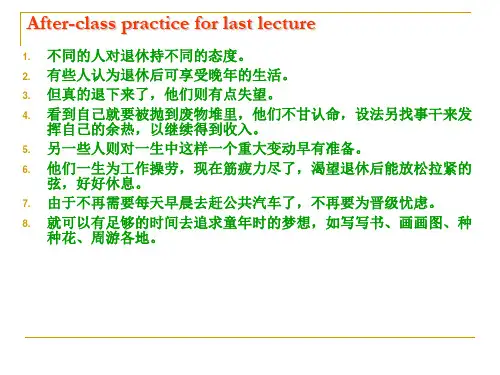
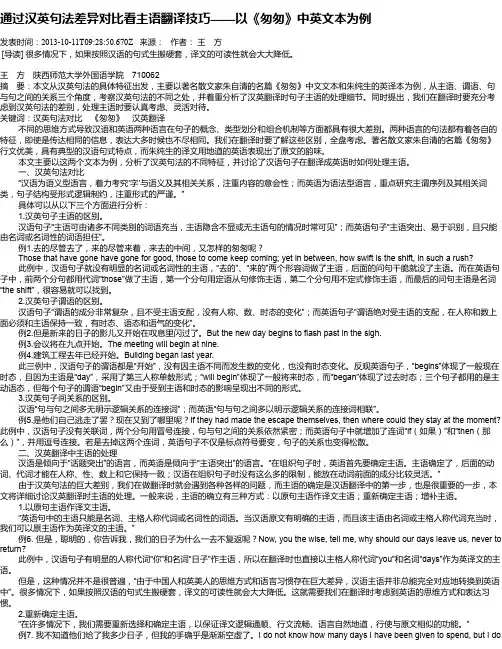
通过汉英句法差异对比看主语翻译技巧——以《匆匆》中英文本为例发表时间:2013-10-11T09:28:50.670Z 来源:作者:王方[导读] 很多情况下,如果按照汉语的句式生搬硬套,译文的可读性就会大大降低。
王方陕西师范大学外国语学院710062摘要:本文从汉英句法的具体特征出发,主要以著名散文家朱自清的名篇《匆匆》中文文本和朱纯生的英译本为例,从主语、谓语、句与句之间的关系三个角度,考察汉英句法的不同之处,并着重分析了汉英翻译时句子主语的处理细节。
同时提出,我们在翻译时要充分考虑到汉英句法的差别,处理主语时要认真考虑、灵活对待。
关键词:汉英句法对比《匆匆》汉英翻译不同的思维方式导致汉语和英语两种语言在句子的概念、类型划分和组合机制等方面都具有很大差别。
两种语言的句法都有着各自的特征,即使是传达相同的信息,表达大多时候也不尽相同。
我们在翻译时要了解这些区别,全盘考虑。
著名散文家朱自清的名篇《匆匆》行文优美,具有典型的汉语句式特点,而朱纯生的译文用地道的英语表现出了原文的韵味。
本文主要以这两个文本为例,分析了汉英句法的不同特征,并讨论了汉语句子在翻译成英语时如何处理主语。
一、汉英句法对比“汉语为语义型语言,着力考究‘字’与语义及其相关关系,注重内容的意会性;而英语为语法型语言,重点研究主谓序列及其相关词类,句子结构受形式逻辑制约,注重形式的严谨。
”具体可以从以下三个方面进行分析:1.汉英句子主语的区别。
汉语句子“主语可由诸多不同类别的词语充当,主语隐含不显或无主语句的情况时常可见”;而英语句子“主语突出、易于识别,且只能由名词或名词性的词语担任”。
例1.去的尽管去了,来的尽管来着,来去的中间,又怎样的匆匆呢?Those that have gone have gone for good, those to come keep coming; yet in between, how swift is the shift, in such a rush?此例中,汉语句子就没有明显的名词或名词性的主语,“去的”、“来的”两个形容词做了主语,后面的问句干脆就没了主语。
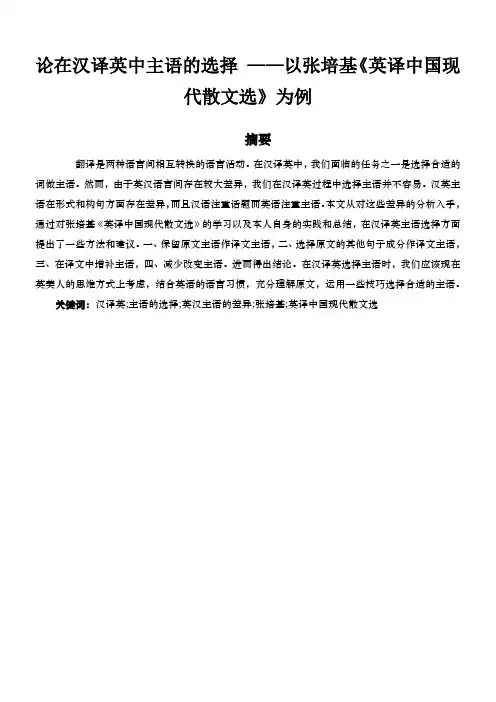
论在汉译英中主语的选择——以张培基《英译中国现代散文选》为例摘要翻译是两种语言间相互转换的语言活动。
在汉译英中,我们面临的任务之一是选择合适的词做主语。
然而,由于英汉语言间存在较大差异,我们在汉译英过程中选择主语并不容易。
汉英主语在形式和构句方面存在差异,而且汉语注重话题而英语注重主语。
本文从对这些差异的分析入手,通过对张培基《英译中国现代散文选》的学习以及本人自身的实践和总结,在汉译英主语选择方面提出了一些方法和建议。
一、保留原文主语作译文主语,二、选择原文的其他句子成分作译文主语,三、在译文中增补主语,四、减少改变主语。
进而得出结论。
在汉译英选择主语时,我们应该现在英美人的思维方式上考虑,结合英语的语言习惯,充分理解原文,运用一些技巧选择合适的主语。
关键词:汉译英;主语的选择;英汉主语的差异;张培基;英译中国现代散文选AbstractTranslation is a language activity of transforming between two languages. In the process of Chinese-English translation, choosing the suitable words as subjects is one of the tasks people facing with. However, it's not easy for people to choose subjects in Chinese-English translation because of the differences between Chinese and English. The subjects of Chinese and English have differences in forms and sentence structure. Furthermore, Chinese is topic-prominent language and English is subject-prominent language. This thesis begins with these differences, puts up some methods and advises about how to choose a suitable subjects through learning Selected Modern Chinese Essays by Zhang Peiji and the author own practices and conclusion. First, keeping the subjects of the original sentences. Second, choosing other constituents of the original sentences. Third, replenishing new subjects for the translation. Fourth, reducing of changing the subjects. And then, the writer shows the conclusion that it should be considered the mode of thinking in western countries, combining with the English language habits, fully understanding the origin text, and use some skills to choose the appropriate subjects.Key words: Chinese-English Translation;the choice of subjects;the differences of subjects in English and Chinese;Zhang Peiji;Selected Modern Chinese EssaysContentsAbstract (I)1.Literature Review 01.1 Existing Researches on this Topic 01.2 Purposes and importance of the study 02. Differences between Chinese and English Subjects (1)2.1 In Forms (1)2.2 Topic-prominent Language vs. Subject-prominent Language12.3 In Sentence Structure (2)3. Methods of Choosing the Subjects in Chinese-English Translation 23.1 Keep the Subjects of the Original Sentences (3)3.2 Choose other constituents of the Original Sentences (3)3.2.1 Choose the Objects to be the Subjects (4)3.2.2 Choose the Adverbials to be the Subjects (4)3.2.3 Choose the Attributives to be the Subjects (6)3.2.4 Choose the Predicates to be the Subjects (6)3.3 Replenish New Subjects for the Translation (6)3.3.1 Replenish the Suppressed Subjects of the Original .. 73.3.2 Replenish the Impersonal Pronoun “It” (7)3.4 Reduce of Changing the Subjects (8)4. Conclusion (9)Bibliography (10)Acknowledgements (10)1.Literature Review1.1 Existing Researches on this TopicMany scholars discussed the translation of Chinese and English sentences from the perspective of differences between Chinese and English subjects. According to the existing research, there are many different forms of expression between Chinese and English, which can be divided into topic-prominent language and subject-prominent language, covert subject and overt subject, parataxis and hypotaxis in sentence structure, personal subject and impersonal subject. These studies focus on the analysis of subjective differences between Chinese and English languages, but the discussion of subjects in Chinese-English translation is relatively less detailed. In the book Chinese-English Translation Studies and Practice written by Ji Dequan (2005: 105), who puts forward five principles of determining the subjects in Chinese-English translation: "(1) It must conform to the English expression and the background. (2) It must conform to the English way of thinking ". (3) It must be the information that should be emphasized in the sentence. (4) It must follow the logical order of the sentence. (5) It should meet the context of the request ". In addition, Liu Miqing (1992: 37:46) has concluded in his book Contrast and Translation of English and Chinese three specific methods of selecting the subjects in the procession of translating Chinese into English, which are equivalence, shift, and supplement. These studies provide translators with some theories, principles, and strategies to choose the subject of Chinese to English translation.1.2 Purposes and importance of the StudyThe main purposes and importance of my paper can be summarized as the following two aspects. First of all, as a famous translator and translation theorist, Zhang Peiji made a great contribution to the translation of Chinese papers. The qualities and standards of the articles which he translated are very high. His Selected Modem Chinese Essays was widely accepted by readers and scholars to help spread the Chinese culture, so his translation of the paper worthy of translators’ unremitting study, they learned a lot, so as to improve translators’ ability to translate; the other aspect is that there is no denying the important role of the subject in shaping and constructing sentences in both Chinese and English. They also have a significant impact on the cohesion of sentences,but because of the differences between English and Chinese subjects, translators choose an appropriate subject from Chinese into English as a challenge, so it seems that it should be investigated and made detailed use of some useful translation techniques and strategies to help translators’ determine the subject of Chinese to English translation. Zhang Peiji's Chinese prose translation has set a good example in choosing the appropriate subject, so the author chose to analyze own translation works together with him and explore the method of choosing the subject.2.Differences between Chinese and English SubjectsChinese and English belong to two different language families, therefore Chinese finds its root in the Sino-Tibetan Language Family, while English belongs to Indo-European Language Family. Differences exist between the two languages, one of which is the difference between their subjects, so as bring difficulties to us in English learning and Chinese and English translation. This chapter will generally discuss the differences between Chinese and English subjects mainly in the following three facts.2.1 In FormsChinese subjects are diverse and highly compatible. Wei Zhicheng (2003) points out that all kinds of words, phrases and clauses can be used as Chinese subject. Liu Miqing (1992) argues that, due to the diversity of Chinese characteristics, the Chinese language features, almost any form of expression can be directly used as the subject of Chinese, or in other words, topics, such as nouns, verbs, adjectives, quantifiers or any other words, phrases or terms, we consider them to be "topics" rather than "subjects". “TmS (time subject), PlS (place subject), DaS (subject matter), MrS (modifier subject) Chinese subject” (Liu Meiqing, 1992: 39). Unlike Chinese subjects, English subjects are less incompatible and form singular, because they must be nominal. Thus, noun and subject pronouns can be used as subject of English, and as for other non-nominal words, phrases or clauses, if you want to use them as subjects of English, you must change their form and make them nouns.2.2 Topic-prominent Language vs. Subject-prominent LanguageAccording to Li and Thompson (1976) theory, different languages can be divided into four categories, namely the subject-prominent language, thetopic-prominent language, both the subject-prominent and the topic-prominent language, neither the subject-prominent nor the topic-prominent language. And they show that Chinese belongs to the topic-prominent language which is the informational units of topic and comment that are basic to the structure of sentences, while English is the subject-prominent language which is the grammatical units of the subject and predicate that are basic to the structure of sentences. English focuses more on the relationship between the subject and the actor and the action, and the performance of the behavior can be found in the close grammatical relationship between the English subject and the predicate. This is not the same as Chinese. Zhao Yuanren (1979) said that only about 50% of the relationship between the Chinese subject and the predicate reflects the relationship between the actor and the behavior, so it is best to be the Chinese subject and predicate as the topic and comment. This also explains why Chinese subjects are more diverse than English subjects.2.3 In Sentence StructureFrom the above discussion, you can conclude that that English emphasizes the subject. They are indispensable in constructing sentences. In most cases, the subject is the starting point, the center and the must in English sentences. Often using the formal subject "it" can also be a good explanation of the English subject is indispensable. They have a decisive grammatical function and have a comprehensive and close relationship with the whole sentence. In English, the subject decides the number of predicates, so it should be consistent with the subject when the sentence is constructed. “The main body and the predicate form the seven main English sentences, namely SV, SVC, SVO, SVA, SVOO, SVOC, SVOA.” (Quirk, R., Greenbaum, G. Leech & J. Svartvik, 1985: 721). These forms of sentences also reveal the importance of English subjects. Chinese sentences are more flexible and do not have to follow strict sentences as English. As for the Chinese subject, they are not indispensable in the sentence structure and are not related to the form of the predicate. No subject sentences are common to meet in Chinese, and in many cases the subject can be omitted.3.Methods of Choosing the Subjects in Chinese-English Translation3.1 Keep the Subjects of the Original SentencesFrom the analysis and discussion in section two, translators understand that the subject of English sentences is mainly nouns, subjective pronouns or nominal words. If the original Chinese has a clear subject, and the subject is composed of nouns or subjective pronouns, and in line with the English primitive order, which is the thematic progression pattern. And then the translation of the original subject can be used as the subject of English translation. This is the easiest and most reliable means of choosing a subject in Chinese to English translation.(1)这激流永远动荡着,并不曾有一个时候停止过,而且它也不能够停止;没有什么东西可以阻止它。
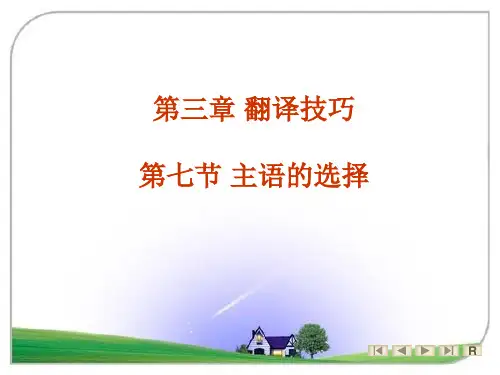

主语的选择①名词特性②搭配合理③主题突出④注意尾重⑤注意连贯①名词特性主语必须是名词,包括名词短语,名词性从句,也包括具有名词特性的-ing分词,动词不定式to do全球发展不平衡加剧。
Imbalance in global development has widened.求和平、谋发展、促和平已经成为各国人民的普遍愿望。
To promote peace, development and cooperation has become the shared aspiration of people across the world.建设生态文明,是关系人民福祉、民族未来的长远大计。
Promoting ecological progress is a long-term task of vital importance to the People’s well-being and China’s future. (to do 也可以)②搭配合理上海豫园的九曲桥,景随步移,美不胜收,旅游小册子中有这样一句话:每一次转折都会看到不同的景色。
Every turning can see/admire/enjoy a different view. ???转折做主语吗?中文是话题为主的,汉语看上去是主语,实际在英文中不过是时间,是地点或是状语。
唐朝出现了真正意义上的中国传统园林建筑。
园林出现了在唐朝。
Traditional Chinese architecture in a real sense first emerged/appeared in the Tang Dynasty.宋朝发明了活版印刷术。
③主题突出第四十一届世博会规模为历届之最。
The scale of the 41st World Expo is the biggest of its kind???The 41st World Expo is the biggest of its kind in scale.中国古典园林规模大小不等。
汉译英时主语的添加与选择可以说,单就句子成分而言,英汉两种语言对主语的看法分歧最大。
汉语不强调主语,因为汉语中的大多数句子都是话题结构。
因此只要和述题有语义上的联系,即使没有直接的逻辑关系和语法搭配关系,任何内容、成分和词类都可处在主语的位置上。
但是在英语中,句子的主语和谓语一定要有直接的逻辑关系和语法搭配关系。
一,主语的添加与汉语不同,主语是英语句子不可或缺的重要成分。
翻译时如碰到汉语中的无主句或省略主语的句子,就需要添加主语。
1),基本路线要管一百年,动摇不得。
Version 1: We should adhere to the basic line for a hundred years, with no vacillation.Version 2: The basic line should be adhered to for 100 years, and there must be no vacillation.2),说过来,说过去,就是一句话,坚持这个(三中全会以来的)路线、方针、政策不变。
Version 1: After all that’s been said, I can sum up our position in one sentence: we shall keep to this line and these principles and policies. Version 2: After all that’s been said, one sentence sums it up: we will stick to this line and these principles and policies.3),(不要怕犯错误)坚持这种态度就不要紧,就不会犯大错误。
Version 1: So long as we stick to this attitude, it will be all right and we will not commit any major mistakes.Version 2: So long as we keep to this attitude, everything will be all right, and we shall not make any major mistakes.二,主语的选择与确定1, 出于连贯的考虑对主语进行选择与确定一个英语段落或句群的句子的话题有向心性。